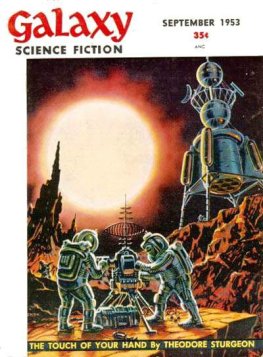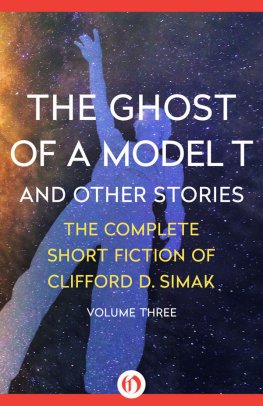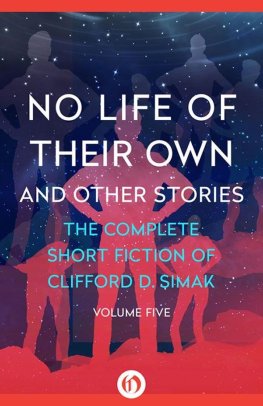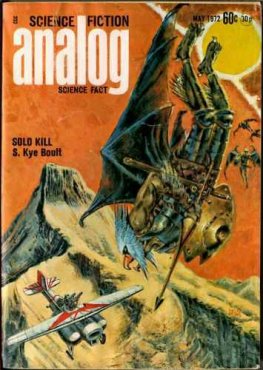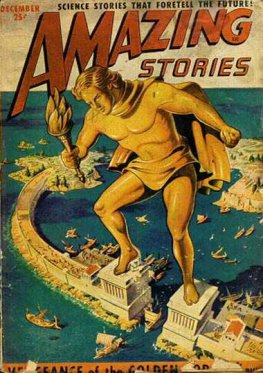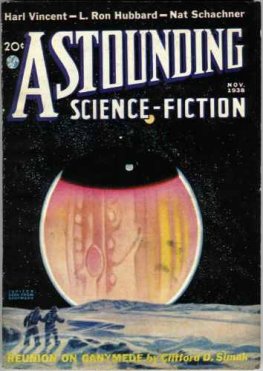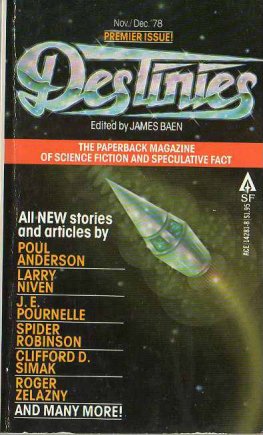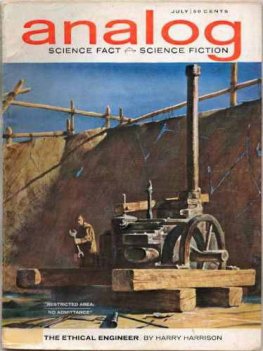Clifford Simak - Worrywart
Here you can read online Clifford Simak - Worrywart full text of the book (entire story) in english for free. Download pdf and epub, get meaning, cover and reviews about this ebook. year: 1953, publisher: Galaxy Publishing Corp., genre: Science fiction. Description of the work, (preface) as well as reviews are available. Best literature library LitArk.com created for fans of good reading and offers a wide selection of genres:
Romance novel
Science fiction
Adventure
Detective
Science
History
Home and family
Prose
Art
Politics
Computer
Non-fiction
Religion
Business
Children
Humor
Choose a favorite category and find really read worthwhile books. Enjoy immersion in the world of imagination, feel the emotions of the characters or learn something new for yourself, make an fascinating discovery.
- Book:Worrywart
- Author:
- Publisher:Galaxy Publishing Corp.
- Genre:
- Year:1953
- Rating:4 / 5
- Favourites:Add to favourites
- Your mark:
- 80
- 1
- 2
- 3
- 4
- 5
Worrywart: summary, description and annotation
We offer to read an annotation, description, summary or preface (depends on what the author of the book "Worrywart" wrote himself). If you haven't found the necessary information about the book — write in the comments, we will try to find it.
Worrywart — read online for free the complete book (whole text) full work
Below is the text of the book, divided by pages. System saving the place of the last page read, allows you to conveniently read the book "Worrywart" online for free, without having to search again every time where you left off. Put a bookmark, and you can go to the page where you finished reading at any time.
Font size:
Interval:
Bookmark:
Worrywart
by CLIFFORD D. SIMAK

Illustrated by KNOTH
CHARLEY PORTER is a copyreader on the Daily Times and a copyreader is a funny kind of critter. He is a comma watcher and a word butcher and a mighty tide of judgment set against the news. He's a sort of cross between a walking encyclopedia and an ambulatory index.
Occasionally you meet a reporter or an editor or you see their pictures or you hear them spoken of. But you never hear about a copyreader.
The copyreader sits with his fellow copyreaders at a horseshoe-shaped table. If he's an old time copyreader, like Charley is, he wears a green eyeshade and rolls his shirtsleeves up above his elbows.
Inside the curve of the copy-desk sits the man who directs the copyreaders. Since the inside of the desk is known as the slot, this man is called the slot man. To the slot man comes the daily flow of news; he passes the copy to the men around the desk and they edit it and write the headlines.
Because there is always copy enough to fill twenty times the allotted space, the copyreader must trim all the stories and see there is no excess wordage in them. This brings him into continuous collision with reporters, who see their ornately worded stories come out chopped and mangled, although definitely more readable.
When work slacks off in the afternoon, the copyreaders break their silence and talk among themselves. They talk about the news and debate what can be done about it. If you listened to them, not knowing who they were, you'd swear you were listening in on some world commission faced by weighty problems on which life or death depended.
For your copyreader is a worrier. He worries because each day he handles the fresh and bleeding incidents that shape the course of human destiny, and there probably is no one who knows more surely nor feels more keenly the knife-edge balance between survival and disaster.
CHARLEY PORTER worried more than most. He worried about a lot of things that didn't seem to call for worry.
There was the matter, for instance, of those "impossible" stories happening in sequence. The other men on the copydesk took notice of them after two or three had occurred, and talked about themamong themselves, naturally, for no proper copyreader ever talks to anyone but another copyreader. But they passed them off with only casual mention.
Charley worried about the incidents, secretly, of course, since he could see that none of his fellow copyreaders felt them worthy of really serious worry. After he had done a lot of worrying, he began to see some similarity among them, and that was when he really got down on the floor and wrestled with himself.
First there had been the airliner downed out in Utah. Bad weather held up the hunt for it, but finally air searchers spotted the wreckage strewn over half a mountain peak. Airline officials said there was no hope that any had survived. But when the rescuers were halfway to the wreckage, they met the survivors walking out; every single soul had lived through the crash.
Then there was the matter of Midnight, the 64 to 1 shot, winning the Derby.
And, after that, the case of the little girl who didn't have a chance of getting well. They held a party for her weeks ahead of time so she could have a final birthday. Her picture was published coast to coast and the stories about her made you want to cry and thousands of people sent her gifts and postcards. Then, suddenly, she got well. Not from any new wonder drug or from any new medical technique. She just got well, some time in the night.
A few days later the wires carried the story about old Pal, the coon dog down in Kentucky who got trapped inside a cave. Men dug for days and yelled encouragement. The old dog whined back at them, but finally he didn't whine any more and the digging was getting mighty hard.
So the men heaped boulders into the hole they'd dug and built a cairn. They said pious, angry, hopeless words, then went back to their cabins and their plowing.
The next day old Pal came home. He was a walking rack of bones, but he still could wag his tail. The way he went through a bowl of milk made a man feel good just to see him do it. Everyone agreed that old Pal must finally have found a way to get out by himself.
Except that an old dog buried in a cave for days, getting weaker all the time from lack of food and water, doesn't find a way to get out by himself.
And little dying girls don't get well, just like that, in the middle of the night.
And 64 to 1 shots don't win the Derby.
And planes don't shatter themselves among the Utah peaks with no one getting hurt at all.
A miracle, sure. Two miracles, even. But not four in a row and within a few weeks of one another.
IT took Charley quite a while to establish some line of similarity. When he did, it was a fairly thin line. But thick enough, at least, to justify more worry.
The line of similarity, was this: All the stories were "running" or developing stories.
There had been a stretch of two days during which the world waited for the facts of the plane crash. It had been known for days before the race that Midnight would run and that he didn't have a chance. The story of the doomed little girl had been a matter of public interest for weeks. The old coon dog had been in the cave a week or more before the men gave up and went back to their homes.
In each of the stories, the result was not known until some time after the situation itself was known. Until the final fact was actually determined, there existed an infinite number of probabilities, some more probable than others, but with each probability's having at least a fighting chance. When you flip a dime into the air, there always exists the infinitesimal probability, from the moment you flip it until it finally lands heads or tails, that it will land on edge and stay there. Until the fact that it is heads or tails is established, the probability of its landing on edge continues to remain.
And that was exactly what had happened, Charley told himself :
The dime had been flipped four times, and four times running it had stood on edge.
There was one minor dissimilarity, of course . . . the plane crash. It didn't quite fit.
Each event had been a spin of the dime, and while that dime was still in air, and the public held its breath, a little girl had gotten well, somehow, and a dog had escaped from a cave, somehow, and a 64 to 1 shot had developed whatever short-lived properties of physique and temperament are necessary to make long shots win.
But the plane crashthere had been no thought of it until after the fact. By the time the crash came into the public eye, the dime was down, and what had happened on that mountain peak had already happened, and all the hopes and prayers offered for the safety of the passengers were, actually, retroactive in the face of the enormous probability that all had perished.
Please, let the dog escape. Tonight.
Let the little girl get well. Soon. Let my long shot come in. Next week.
Let the passengers be alive. Since yesterday.
Somehow the plane crash worried Charley most of all.
THEN, to everyone's surprise, and with no logic whatsoever, the Iranian situation cleared up, just when it began to look as if it might be another Korea.
A few days later Britain announced, proudly that it had weathered its monetary storm, that all was well with the sterling bloc, and London would need no further loans.
It took a while for Charley to tie these two stories up with the plane-girl-Derby-hound-dog sequence. But then he saw that they belonged and that was when he remembered something else that mightwell, not tie-in, exactlybut might have something to do with this extraordinary run of impossibilities.
Font size:
Interval:
Bookmark:
Similar books «Worrywart»
Look at similar books to Worrywart. We have selected literature similar in name and meaning in the hope of providing readers with more options to find new, interesting, not yet read works.
Discussion, reviews of the book Worrywart and just readers' own opinions. Leave your comments, write what you think about the work, its meaning or the main characters. Specify what exactly you liked and what you didn't like, and why you think so.

